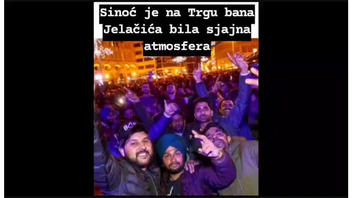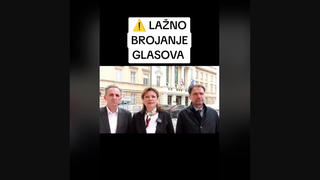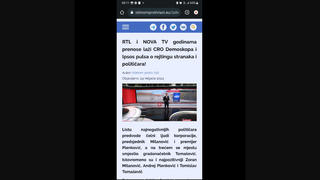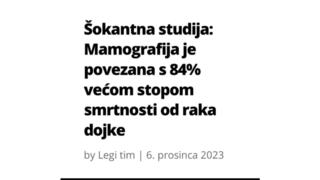
Have the demographics of Zagreb shifted to the extent that Croatian nationals are now in the minority, while Nepali, Pakistani, Syrian and Afghan nationals have become the majority? No, that's not true: Based on the official population census of 2021, over 93 percent of Zagreb's population comprises Croatian nationals, with 99.13 percent of citizens being Croatian. Notably, individuals from Nepal, Pakistan, Syria and Afghanistan do not even register as minorities on the demographic list.
The claim appeared in a video (archived here) on TikTok by Dražen Keleminec on January 2, 2024. It opened (translated from Croatian to English by Lead Stories staff):
... when Andrej Plenković became the president of HDZ, he said that he would first change HDZ and then change Croatia. During Christmas, I walked from the railway station, from King Tomislav Square to Ban Josip Jelačić Square. There were thousands and thousands of people all along the entire Zrinjevac park. I was shocked when I saw that we became a minority in Zagreb! I saw 20% of Croats, and 80% of people from Nepal, Pakistan, Syria, Afghanistan. We became a minority in Zagreb. This was even seen in Ban Josip Jelačić square, at the New Year 2024 celebration. That's exactly what Plenković said, 'I will change Croatia.'...
This is what the post looked like on TikTok at the time of writing:

(Source: TikTok screenshot taken on Wed Mar 13 20:06:39 2024 UTC)
Dražen Keleminec is a Croatian politician, president of the alt-right political party Autochthonous - Croatian Party of Rights (archived here). In 2000, Keleminec was expelled from his previous political party Croatian Party of Rights 1861, after he beat his wife in public. He has been arrested multiple times (archived here, here and here), he was reported to the police (archived here) for inciting hatred and violence, and he was banned from visiting (archived here) the Serbian National Council, SDP and HDZ headquarters, as well as the Jasenovc camp memorial site (archived here) and the Serb settlement (archived here).
His claims about the Zagreb population are baseless. According to the last official population census (archived here) from 2021, Croatian nationals are the majority in the country's capital. In the City of Zagreb, there is a total of 767,131 people. Croats make up 93.53 percent of them, with 717,526 people. Serbian nationals follow with 1.57 percent of the total population, which is 12,034 people. Bosnian nationals make up 0.86 percent, with 6,566 people, and Albanian 0.45 percent with a total population of 3,475.

(Source: Bureau of Statistics screenshot taken on Thu Mar 14 08:56:39 2024 UTC)
Nepali, Pakistani, Syrian and Afghan nationals were not included in the official list, presumably because their total number was too small.
Regarding citizenship, the population distribution shows remarkable similarity. In Zagreb, 99.13 percent of residents hold Croatian citizenship, with 3.3 percent possessing both Croatian and other citizenships. Foreign residents lacking Croatian citizenship constitute 0.86 percent of Zagreb's population, totaling 6,559 individuals, while there are 93 persons without citizenship, which is 0.01 percent.

(Source: Bureau of Statistics screenshot taken on Thu Mar 14 08:59:27 2024 UTC)
According to the estimations from the Bureau of Statistics, the population of Zagreb in 2022 stood at 767,445 individuals (archived here). According to data provided by the City of Zagreb (archived here), a total of 21,578 people relocated to the city in 2022, with 11.7 percent of them originating from Ukraine. Data for the year 2023 is currently unavailable.
Given that the estimated figures are based on data from two years ago as of the writing of this article, it's conceivable that the population distribution may have shifted, particularly with the influx of foreign residents to Zagreb since 2022. Nevertheless, for a minority to transition into a majority, their prevalence must exceed 50 percent. This would imply that over 767,445 individuals from Nepal, Pakistan, Syria and Afghanistan would need to have relocated to Zagreb in the past two years, an outcome that seems highly unlikely.
More Lead Stories fact checks on the claims about migrants in Croatia can be found here.








